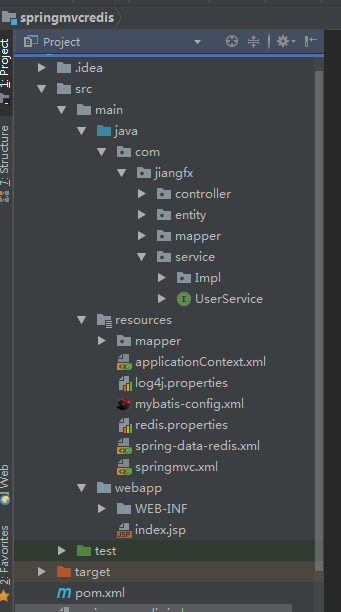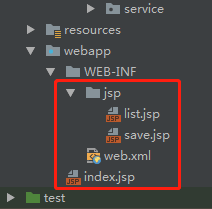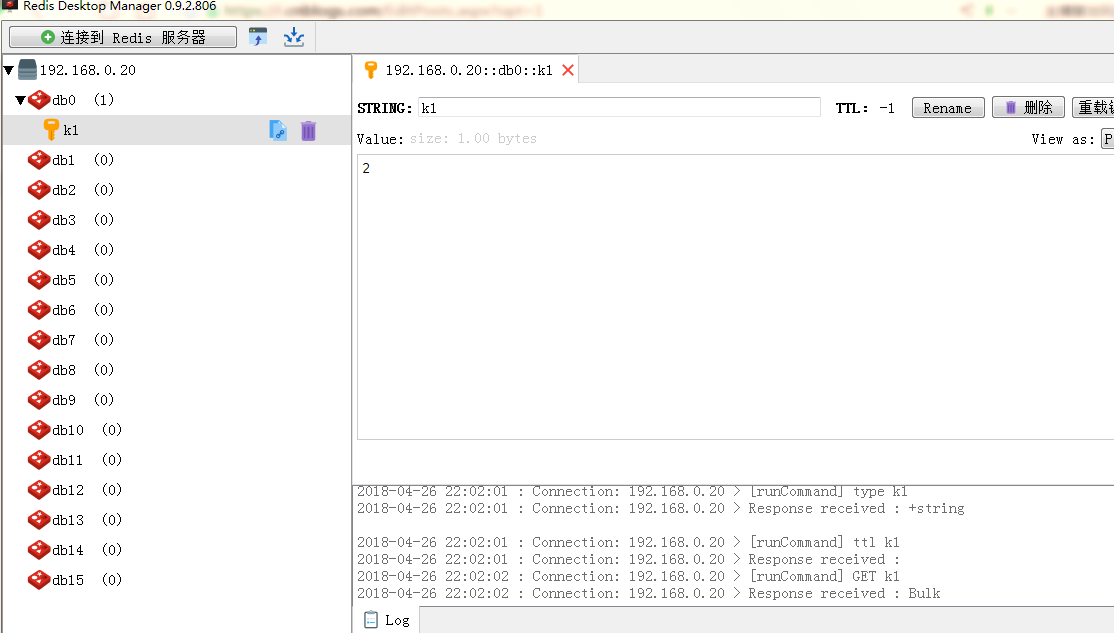springmvc+mybatis+redis实现查询插入操作
最近在学习redis,虽然现在还不是很熟练。不过可以进行简单的框架整合开发。
IDE:我使用的是IDEA。springmvc+spring+mybatis的整合这个我就不多说了,下面我们先进行这块的整合,最后在加入redis。下边这块就直接上代码。
源码:https://gitee.com/smfx1314/springmvcredis.git
首先看一下我的工程结构:

第一步:在pox.xml中引入jar
<?xml version="1.0" encoding="UTF-8"?> <project xmlns="http://maven.apache.org/POM/4.0.0" xmlns:xsi="http://www.w3.org/2001/XMLSchema-instance" xsi:schemaLocation="http://maven.apache.org/POM/4.0.0 http://maven.apache.org/xsd/maven-4.0.0.xsd"> <modelVersion>4.0.0</modelVersion> <groupId>com.jiangfx</groupId> <artifactId>springmvc-redis</artifactId> <version>1.0-SNAPSHOT</version> <packaging>war</packaging> <name>springmvc-redis Maven Webapp</name> <!-- FIXME change it to the project's website --> <url>http://www.example.com</url> <properties> <project.build.sourceEncoding>UTF-8</project.build.sourceEncoding> <maven.compiler.source>1.7</maven.compiler.source> <maven.compiler.target>1.7</maven.compiler.target> </properties> <dependencies> <dependency> <groupId>junit</groupId> <artifactId>junit</artifactId> <version>4.11</version> <scope>test</scope> </dependency> <dependency> <groupId>org.springframework</groupId> <artifactId>spring-core</artifactId> <version>4.3.2.RELEASE</version> </dependency> <dependency> <groupId>org.springframework</groupId> <artifactId>spring-aop</artifactId> <version>4.3.2.RELEASE</version> </dependency> <dependency> <groupId>org.springframework</groupId> <artifactId>spring-aspects</artifactId> <version>4.3.2.RELEASE</version> </dependency> <dependency> <groupId>org.springframework</groupId> <artifactId>spring-beans</artifactId> <version>4.3.2.RELEASE</version> </dependency> <dependency> <groupId>org.springframework</groupId> <artifactId>spring-context</artifactId> <version>4.3.2.RELEASE</version> </dependency> <dependency> <groupId>org.springframework</groupId> <artifactId>spring-expression</artifactId> <version>4.3.2.RELEASE</version> </dependency> <dependency> <groupId>org.springframework</groupId> <artifactId>spring-jdbc</artifactId> <version>4.3.2.RELEASE</version> </dependency> <dependency> <groupId>org.springframework</groupId> <artifactId>spring-test</artifactId> <version>4.3.2.RELEASE</version> </dependency> <dependency> <groupId>org.springframework</groupId> <artifactId>spring-tx</artifactId> <version>4.3.2.RELEASE</version> </dependency> <dependency> <groupId>org.springframework</groupId> <artifactId>spring-web</artifactId> <version>4.3.2.RELEASE</version> </dependency> <dependency> <groupId>org.springframework</groupId> <artifactId>spring-webmvc</artifactId> <version>4.3.2.RELEASE</version> </dependency> <dependency> <groupId>org.mybatis</groupId> <artifactId>mybatis-spring</artifactId> <version>1.3.0</version> </dependency> <!-- https://mvnrepository.com/artifact/org.mybatis/mybatis --> <dependency> <groupId>org.mybatis</groupId> <artifactId>mybatis</artifactId> <version>3.4.4</version> </dependency> <!-- https://mvnrepository.com/artifact/commons-io/commons-io --> <dependency> <groupId>commons-io</groupId> <artifactId>commons-io</artifactId> <version>2.4</version> </dependency> <!-- https://mvnrepository.com/artifact/org.apache.commons/commons-lang3 --> <dependency> <groupId>org.apache.commons</groupId> <artifactId>commons-lang3</artifactId> <version>3.4</version> </dependency> <!-- https://mvnrepository.com/artifact/commons-logging/commons-logging --> <dependency> <groupId>commons-logging</groupId> <artifactId>commons-logging</artifactId> <version>1.1.1</version> </dependency> <!-- https://mvnrepository.com/artifact/org.apache.logging.log4j/log4j-core --> <dependency> <groupId>org.apache.logging.log4j</groupId> <artifactId>log4j-core</artifactId> <version>2.9.1</version> </dependency> <!-- https://mvnrepository.com/artifact/org.slf4j/slf4j-log4j12 --> <dependency> <groupId>org.slf4j</groupId> <artifactId>slf4j-log4j12</artifactId> <version>1.7.21</version> <scope>test</scope> </dependency> <!-- https://mvnrepository.com/artifact/aopalliance/aopalliance --> <dependency> <groupId>aopalliance</groupId> <artifactId>aopalliance</artifactId> <version>1.0</version> </dependency> <dependency> <groupId>mysql</groupId> <artifactId>mysql-connector-java</artifactId> <version>5.1.38</version> </dependency> <dependency> <groupId>com.mchange</groupId> <artifactId>c3p0</artifactId> <version>0.9.5.2</version> </dependency> <!-- https://mvnrepository.com/artifact/javax.servlet/jstl --> <dependency> <groupId>javax.servlet</groupId> <artifactId>jstl</artifactId> <version>1.2</version> </dependency> <!-- https://mvnrepository.com/artifact/javax.servlet/javax.servlet-api --> <dependency> <groupId>javax.servlet</groupId> <artifactId>javax.servlet-api</artifactId> <version>3.1.0</version> <scope>provided</scope> </dependency> <!-- https://mvnrepository.com/artifact/javax.servlet.jsp/javax.servlet.jsp-api --> <dependency> <groupId>javax.servlet.jsp</groupId> <artifactId>javax.servlet.jsp-api</artifactId> <version>2.2.1</version> <scope>provided</scope> </dependency> <!-- https://mvnrepository.com/artifact/taglibs/standard --> <dependency> <groupId>taglibs</groupId> <artifactId>standard</artifactId> <version>1.1.2</version> </dependency> </dependencies> <build> <plugins> <plugin> <groupId>org.apache.maven.plugins</groupId> <artifactId>maven-compiler-plugin</artifactId> <version>3.6.1</version> <configuration> <encoding>utf-8</encoding> </configuration> </plugin> </plugins> </build> </project>
第二步:配置web.xml
<?xml version="1.0" encoding="UTF-8"?> <web-app xmlns:xsi="http://www.w3.org/2001/XMLSchema-instance" xmlns="http://java.sun.com/xml/ns/javaee" xsi:schemaLocation="http://java.sun.com/xml/ns/javaee http://java.sun.com/xml/ns/javaee/web-app_3_0.xsd" id="WebApp_ID" version="3.0"> <!-- 配置spring --> <context-param> <param-name>contextConfigLocation</param-name> <param-value>classpath:applicationContext.xml</param-value> </context-param> <listener> <listener-class>org.springframework.web.context.ContextLoaderListener</listener-class> </listener> <!-- 编码过滤器 --> <filter> <filter-name>charsetEncodingFilter</filter-name> <filter-class>org.springframework.web.filter.CharacterEncodingFilter</filter-class> <init-param> <param-name>encoding</param-name> <param-value>UTF-8</param-value> </init-param> <init-param> <param-name>forceEncoding</param-name> <param-value>true</param-value> </init-param> </filter> <filter-mapping> <filter-name>charsetEncodingFilter</filter-name> <url-pattern>/*</url-pattern> </filter-mapping> <!-- 配置springmvc --> <servlet> <servlet-name>springDispatcherServlet</servlet-name> <servlet-class>org.springframework.web.servlet.DispatcherServlet</servlet-class> <init-param> <param-name>contextConfigLocation</param-name> <param-value>classpath:springmvc.xml</param-value> </init-param> <load-on-startup>1</load-on-startup> </servlet> <servlet-mapping> <servlet-name>springDispatcherServlet</servlet-name> <url-pattern>/</url-pattern><!-- 拦截所有请求 --> </servlet-mapping> </web-app>
第三步:配置springmvc.xml
<?xml version="1.0" encoding="UTF-8"?> <beans xmlns="http://www.springframework.org/schema/beans" xmlns:xsi="http://www.w3.org/2001/XMLSchema-instance" xmlns:context="http://www.springframework.org/schema/context" xmlns:mvc="http://www.springframework.org/schema/mvc" xsi:schemaLocation="http://www.springframework.org/schema/mvc http://www.springframework.org/schema/mvc/spring-mvc-4.0.xsd http://www.springframework.org/schema/beans http://www.springframework.org/schema/beans/spring-beans.xsd http://www.springframework.org/schema/context http://www.springframework.org/schema/context/spring-context-4.0.xsd"> <!-- 配置自动扫描的包 --> <context:component-scan base-package="com.jiangfx.controller"/> <!-- 配置静态资源文件 --> <mvc:default-servlet-handler/> <!-- 开启注解模式 --> <mvc:annotation-driven/> <!-- 配置视图解析器 --> <bean class="org.springframework.web.servlet.view.InternalResourceViewResolver"> <property name="prefix" value="/WEB-INF/jsp"></property><!-- 视图路径 --> <property name="suffix" value=".jsp"></property><!-- 视图后缀名 --> </bean> </beans>
第四步:配置applicationContext.xml
<?xml version="1.0" encoding="UTF-8"?> <beans xmlns="http://www.springframework.org/schema/beans" xmlns:xsi="http://www.w3.org/2001/XMLSchema-instance" xmlns:context="http://www.springframework.org/schema/context" xmlns:tx="http://www.springframework.org/schema/tx" xsi:schemaLocation="http://www.springframework.org/schema/beans http://www.springframework.org/schema/beans/spring-beans.xsd http://www.springframework.org/schema/context http://www.springframework.org/schema/context/spring-context-4.0.xsd http://www.springframework.org/schema/tx http://www.springframework.org/schema/tx/spring-tx-4.0.xsd"> <!-- 配置扫描的包 --> <context:component-scan base-package="com.jiangfx.service"/> <!-- 配置数据库 --> <!-- 加载配置文件 --> <bean id="dataSource" class="com.mchange.v2.c3p0.ComboPooledDataSource"> <property name="driverClass" value="com.mysql.jdbc.Driver"></property> <property name="jdbcUrl" value="jdbc:mysql://localhost:3306/springredis"></property> <property name="user" value="root"></property> <property name="password" value="1234"></property> </bean> <!-- 配置sqlSessionFactory, 并将数据源注入 --> <bean id="sqlSessionFactory" class="org.mybatis.spring.SqlSessionFactoryBean"> <!-- 引入数据源 --> <property name="dataSource" ref="dataSource"></property> <!--载入mybatis配置文件--> <property name="configLocation" value="classpath:mybatis-config.xml"/> <!--载入配置mapper映射的xml--> <property name="mapperLocations" value="classpath:mapper/*.xml"/> </bean> <!-- 配置映射接口 --> <bean class="org.mybatis.spring.mapper.MapperScannerConfigurer"> <property name="basePackage" value="com.jiangfx.mapper"/> <property name="sqlSessionFactoryBeanName" value="sqlSessionFactory"></property> </bean> <!-- 配置声明式事务 --> <bean id="transactionManager" class="org.springframework.jdbc.datasource.DataSourceTransactionManager"> <property name="dataSource" ref="dataSource"></property> </bean> <tx:annotation-driven transaction-manager="transactionManager"/> </beans>
实体类:entity。一定要实现序列化接口,不然redis没法对其操作
package com.jiangfx.entity; import java.io.Serializable; /** * Created by jiangfeixiang on 2018/4/27 */ public class User implements Serializable { private Integer id; private String username; public Integer getId() { return id; } public void setId(Integer id) { this.id = id; } public String getUsername() { return username; } public void setUsername(String username) { this.username = username; } @Override public String toString() { return "User{" + "id=" + id + ", username='" + username + '\'' + '}'; } }
第五步:Mapper层
编写UserMapper接口
package com.jiangfx.mapper; import com.jiangfx.entity.User; import java.util.List; /** * Created by jiangfeixiang on 2018/4/27 */ public interface UserMapper { /** * 查询 * @return */ List<User> getAll(); /** * 插入 * @param user */ void insertUser(User user); }
之后我们编写对应的UserMapper.xml
<?xml version="1.0" encoding="UTF-8" ?> <!DOCTYPE mapper PUBLIC "-//mybatis.org//DTD Mapper 3.0//EN" "http://mybatis.org/dtd/mybatis-3-mapper.dtd"> <mapper namespace="com.jiangfx.mapper.UserMapper"> <!-- 查询 --> <select id="getAll" resultType="User"> select * from user </select> <!--插入--> <insert id="insertUser" parameterType="User"> insert into user(id,username) VALUES (#{id},#{username}) </insert> </mapper>
第六步:service层
首先是UserService接口
package com.jiangfx.service; import com.jiangfx.entity.User; import java.util.List; /** * Created by jiangfeixiang on 2018/4/27 */ public interface UserService { /** * 查询 * @return */ List<User> getAll(); /** * 插入 */ void insertUser(User user); }
然后是对应的实现类
package com.jiangfx.service.Impl; import com.jiangfx.entity.User; import com.jiangfx.mapper.UserMapper; import com.jiangfx.service.UserService; import org.springframework.beans.factory.annotation.Autowired; import org.springframework.cache.annotation.CachePut; import org.springframework.cache.annotation.Cacheable; import org.springframework.stereotype.Service; import org.springframework.transaction.annotation.Transactional; import java.util.List; /** * Created by jiangfeixiang on 2018/4/27 */ @Service @Transactional public class UserServiceImpl implements UserService { //注入userMapper @Autowired private UserMapper userMapper; /** * 查询所有 * 使用@Cacheable地很诡异缓存策略, * 当缓存中有值,则返回缓存数据,否则则访问数据库 * value引用缓存管理器,key定义缓存的键 * @return */ @Override // @Cacheable(value = "redisCacheManager",key = "'getAll'") public List<User> getAll() { List<User> userMapperAll = userMapper.getAll(); System.out.println("没有走缓存就打印我..........."); return userMapperAll; } /** * 添加用户 */ @Override // @CachePut(value = "redisCacheManager",key = "'insertUser'") public void insertUser(User user){ userMapper.insertUser(user); } }
第七部:controller层
UserController
package com.jiangfx.controller; import com.jiangfx.entity.User; import com.jiangfx.service.UserService; import org.springframework.beans.factory.annotation.Autowired; import org.springframework.stereotype.Controller; import org.springframework.web.bind.annotation.RequestMapping; import org.springframework.web.bind.annotation.RequestMethod; import java.util.List; /** * Created by jiangfeixiang on 2018/4/27 */ @Controller public class UserController { //注入 @Autowired private UserService userService; /** * 查询所有用户 */ @RequestMapping(value = "/getAll",method = RequestMethod.GET) public String getAll(){ List<User> list = userService.getAll(); return "list"; } /** * 跳转到添加页面 */ @RequestMapping(value = "/insertUserPage",method = RequestMethod.GET) public String insertUserPage(){ return "save"; } /** * 插入 */ @RequestMapping(value = "/insertUser",method = RequestMethod.POST) public String insertUser(User user){ userService.insertUser(user); return "redirect:/getAll"; } }
JSP页面很简单,主要是为了测试用,一个欢迎页index.jsp,一个添加用户页save.jsp,一个操作成功跳转对应页面的list.jsp

index.jsp
<a href="/getAll">查询</a> <a href="/insertUserPage">添加</a>
save.jsp
<form action="/insertUser" method="post"> 姓名:<input type="text" name="username"> <input type="submit" value="提交"> </form>
list.jsp我就直接一句话,成功。你们看着写。
之后启动测试看看是否成功。当然,如果你安照我的写,那么肯定不会错的。
接下来我们开始配置redis。
首先加入jar包:
<!-- jedis --> <dependency> <groupId>redis.clients</groupId> <artifactId>jedis</artifactId> <version>2.7.3</version> </dependency> <!-- spring-data-redis --> <dependency> <groupId>org.springframework.data</groupId> <artifactId>spring-data-redis</artifactId> <version>1.6.2.RELEASE</version> </dependency>
然后:创建一个spring-data-redis.xml专门放置redis的配置,在来一个redis.properties属性文件,放置redis的属性配置。如下:
redis.properties
# Redis Setting # Redis默认有16个库,序号是0-15,默认是选中的是0号数据库 spring.redis.database=0 # Redis服务器地址 spring.redis.host=(你的地址) # Redis服务器连接端口,默认是6379 spring.redis.port=6379 # Redis服务器连接密码(默认为空) spring.redis.password= # 连接池最大阻塞等待时间(使用负值表示没有限制),根据实际情况修改 spring.redis.pool.maxWaitMillis=-1 # 连接池中的最大空闲连接,根据实际情况修改 spring.redis.pool.maxIdle=8 # 连接池中的最小空闲连接,根据实际情况修改 spring.redis.pool.minIdle=0 # 连接超时时间(毫秒),根据实际情况修改 spring.redis.timeout=2000
spring-data-redis.xml
<?xml version="1.0" encoding="UTF-8"?>
<beans xmlns="http://www.springframework.org/schema/beans"
xmlns:xsi="http://www.w3.org/2001/XMLSchema-instance" xmlns:cache="http://www.springframework.org/schema/cache"
xmlns:context="http://www.springframework.org/schema/context"
xmlns:redis="http://www.springframework.org/schema/redis" xmlns:tx="http://www.springframework.org/schema/tx"
xsi:schemaLocation="http://www.springframework.org/schema/cache http://www.springframework.org/schema/cache/spring-cache-4.0.xsd
http://www.springframework.org/schema/beans http://www.springframework.org/schema/beans/spring-beans.xsd
http://www.springframework.org/schema/context http://www.springframework.org/schema/context/spring-context-4.0.xsd
http://www.springframework.org/schema/redis http://www.springframework.org/schema/redis/spring-redis-1.0.xsd
http://www.springframework.org/schema/tx http://www.springframework.org/schema/tx/spring-tx-4.0.xsd">
<!-- 载入redis.properties,这里要特别注意,如果有多个properties文件,必须用逗号分开,不能写成两个 <context:property-placeholder/> -->
<context:property-placeholder location="classpath:redis.properties" />
<!-- 配置JedisPoolConfig连接池-->
<bean id="poolConfig" class="redis.clients.jedis.JedisPoolConfig">
<property name="maxIdle" value="${spring.redis.pool.maxIdle}"></property>
<property name="minIdle" value="${spring.redis.pool.minIdle}"></property>
<property name="maxWaitMillis" value="${spring.redis.pool.maxWaitMillis}"></property>
</bean>
<!-- 配置jedis连接工厂 -->
<bean id="connectionFactory"
class="org.springframework.data.redis.connection.jedis.JedisConnectionFactory">
<property name="poolConfig" ref="poolConfig"></property>
<property name="hostName" value="${spring.redis.host}"></property>
<property name="port" value="${spring.redis.port}"></property>
<!--<property name="password" value="${spring.redis.password}"></property>-->
<property name="database" value="${spring.redis.database}"></property>
<property name="timeout" value="${spring.redis.timeout}"></property>
</bean>
<!-- 配置RedisTemplate -->
<bean id="redisTemplate" class="org.springframework.data.redis.core.RedisTemplate">
<property name="connectionFactory" ref="connectionFactory"></property>
<!--String-->
<property name="keySerializer">
<bean class="org.springframework.data.redis.serializer.StringRedisSerializer"></bean>
</property>
<property name="valueSerializer">
<bean class="org.springframework.data.redis.serializer.JdkSerializationRedisSerializer"></bean>
</property>
<!--hash-->
<property name="hashKeySerializer">
<bean class="org.springframework.data.redis.serializer.StringRedisSerializer"></bean>
</property>
<property name="hashValueSerializer">
<bean class="org.springframework.data.redis.serializer.StringRedisSerializer"></bean>
</property>
</bean>
<!--
定义缓存管理器redisCacheManager。
注意:cache-manager默认值是cacheManager,你的缓存管理器id要是命名是cacheManager,这里可以省略
-->
<!--1.使用注解驱动-->
<cache:annotation-driven cache-manager="redisCacheManager"></cache:annotation-driven>
<!--2.定义缓存管理器-->
<bean id="redisCacheManager" class="org.springframework.data.redis.cache.RedisCacheManager">
<!--通过构造方法注入redisTemplate-->
<constructor-arg index="0" ref="redisTemplate"></constructor-arg>
<!--定义超时时间,单位秒-->
<property name="defaultExpiration" value="5000"></property>
<!--设置缓存器名称-->
<property name="cacheNames">
<list>
<value>redisCacheManager</value>
</list>
</property>
</bean>
</beans>
在applicationContext中引入redis的配置spring-data-redis.xml,当然你也可以配置在一起。
<!-- 引入spring-data-redis.xml --> <import resource="spring-data-redis.xml"/>
上面已经定义好缓存管理器了,下面我们就可以在serviceImpl中使用注解进行操作。如下:
在getAll查询方法上添加(serviceImpl中注释掉的那点)
@Cacheable(value = "redisCacheManager",key = "'getAll'")
在insertUser添加方法上加入(serviceImpl中注释掉的那点)
@CachePut(value = "redisCacheManager",key = "'insertUser'")
注意:
value的值是你redis配置文件对应的缓存管理器的id值
key = "'insertUser'":是你要缓存到redis中的值,下次spring会直接通过key获取结果。注意key的值中还有个单引号。
@Cacheable:适合查询,有返回值的方法上。因为,每次请求在进入方法之前,spring会先从缓存服务器中查找对应的key,如果有,就直接返回。否则再去查询数据库,在将结果通过key保存到缓存中。
@CachePut:适合添加,修改,void方法上。因为spring不会事先去缓存服务器中查询数据,而是直接执行方法,然后将结果通过key保存到缓存中。这样是防止数据不一致。
以上都写好后可以启动服务器,然后运行。为了明显,我在serviceImpl中查询方法中有个输出,你可以先注释掉缓存注解运行,发现每次都会输入。当你启动注解时,没有输入。说明spring每次回自动到缓存中查找数据。如下:

(下面的测试你们可以不用理会,这个是我在搭建环境的时候测试是否搭建成功。我的逻辑可能不够清晰,有问题可以联系我)
测试
import org.junit.Test; import org.springframework.context.ApplicationContext; import org.springframework.context.support.ClassPathXmlApplicationContext; import org.springframework.data.redis.core.RedisTemplate; /** * Created by jiangfeixiang on 2018/4/26 */ public class SpringmvcRedisTest { private static ApplicationContext applicationContext; static{ applicationContext = new ClassPathXmlApplicationContext("applicationContext.xml"); } @Test public void testApplicationContext(){ System.out.println("11111111111111111"+applicationContext); } @Test public void testRedisConnection(){ RedisTemplate redisTemplate = (RedisTemplate)applicationContext.getBean("redisTemplate"); redisTemplate.renameIfAbsent("k2", "k1");//如果key=k2存在,则将key修改为k1。前提是你的redis中得有k2。不然报错。这不你也可以不写。 System.out.println(redisTemplate); //这里有输出也可以。 } }
以上测试这块,你可以不用写。
如何查看是否成功?我这里是通过可视化软件:Redis Desktop Manager,你也可以直接在redis-cli客户端查看

以上就是springmvc整合redis的过程,如果有什么问题都可以联系我。


